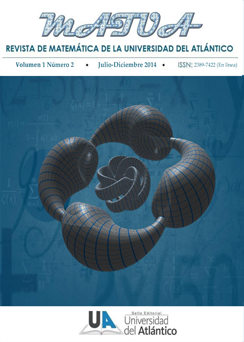OPTIMIZATION OF PARAMETERS FOR MODELING OF A PROBLEM 1D HEAT DIFFUSION
Abstract
Get the model of a physical phenomenon based on experimental measurements will ensure that this model best described the reality that the ideal models, obtaining the dynamic equations which may extend to more accurately predict system behavior in the future. An optimization method based on Gauss-Newton method, which consists in reducing fitting error between a proposed model and a set of corresponding to a phenomenon described by a partial differential equation (PDE) data is proposed. The method will be applied to estimate the change of temperature distribution in a body from synthetic data (not obtained by direct measurement), knowing that the ideal model of this phenomenon is given by the equation of heat diffusion. Taking into account criteria such as precision, accuracy and speed of convergence, finite difference method is used to find the solution of the EDP.
Visitas al artículo
Downloads
References
Ortega J. Historia de la termodinamica. Notas de clase.
Tassi, P. A., and C. R. Engelberger. Introducci´on al M´etodo
de Diferencias Finitas. Notas de clase.
Arfken, George B., Hans J. Weber, and Frank E. Harris.
Mathematical methods for physicists. Academic press, 2005.
Romero, S. Moreno, F. Rodriguez, I. Introducción a las
Ecuaciones en Derivadas Parciales. Primera Edición. Universidad
de Huelva, 2001.
Alvarez R. A. Acoplamiento MEF-MDF para solucionar la
ecuación de conducción del calor con condiciones de frontera tipo
I. Tesis de pregrado programa de física - Universidad del Atlántico, 2013.
Courant, Richard, and David Hilbert. Methods of mathematical physics. Vol. 1 y 2. First English Edition. Wiley-VCH, 2008.
Brodkey, Robert S., and Harry C. Hershey. Transport Phenomena,
Volume 2: A Unified Aprroach. Vol. 2. Brodkey publishing, 2003.
Strikwerda, John. Finite difference schemes and partial differential
equations. Second Edition. Society for Industrial and Applied Mathematics. Philadelphia, 2004.
Rodriguez, Oscar. Extensión del método de las diferencias finitas
en el dominio del tiempo para el estudio de estructuras hibridas de microondas incluyendo circuitos concentrados actives y pasivos. Santander, 2008. 222p. Tesis. Universidad de Cantabria. Departamento de ingeniería de comunicaciones.
Zuazua, E. Métodos Numéricos de resolución de Ecuaciones
en Derivadas Parciales. Universidad Autonoma de Madrid. Primera Edición. 2007.
Dennis, John E., and Robert B. Schnabel. Numerical methods
for unconstrained optimization and nonlinear equations. Vol. 16. Society for Industrial and Applied Mathematics, 1987.
Nocedal, Jorge, and Stephen J. Wright. Numerical optimization.
Second Edition. Springer-Verlag, 2006.
Espinoza, C. y Nino, Y. Metodo de diferencias finitas. Notas de Clase, 2001.
Holman J. P. Heat transfer. New York: McGraw-Hill, 1986.
Amemiya, Takeshi. Nonlinear regression models. Handbook
of econometrics 1 (1983): 333-389.
Marquardt, Donald W. An algorithm for least-squares estimation
of nonlinear parameters. Journal of the Society for Industrial and Applied Mathematics 11.2 (1963): 431-441.


